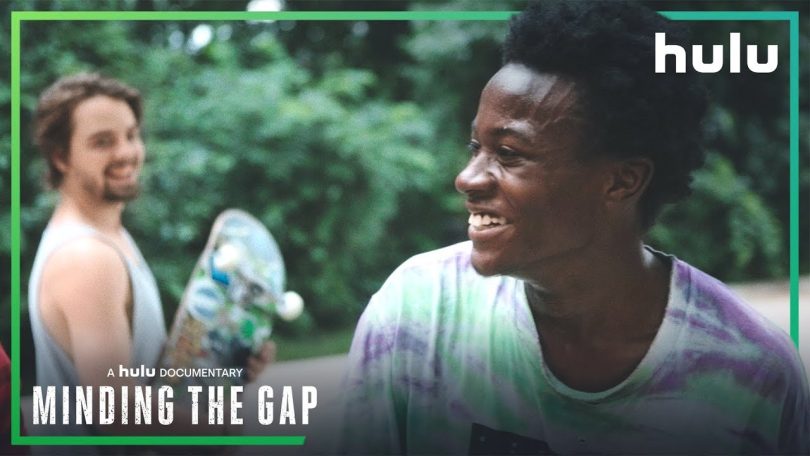Hulu will release MINDING THE GAP, the Winner of the 2018 Sundance US Documentary Competition Jury Award Winner in Breakthrough Filmmaking, in theaters this August.
Continue on to watch MINDING THE GAP…
 CelebNMovies247.com has your first look at MINDING THE GAP from director Bing Liu.
CelebNMovies247.com has your first look at MINDING THE GAP from director Bing Liu.
How MINDING THE GAP became a movie explained by director Bing Liu:
Stay connected to MINDING THE GAP: Official Site | Facebook | Twitter
Director Bing Liu explains how MINDING THE GAP started from filming skateboarding to a feature film exploring the ties between abusive upbringing to skating.
He starts off talking on how the videos turned into something more:
Minding the Gap started as a skate video and snowballed into a film that, every time I showed my friends a new rough cut, increasingly ended in them wanting to talk about their childhoods.
I was 8 years old when my single mother took a job in Rockford, Illinois, a crumbling factory city two hours west of Chicago. She remarried and had a child with a physically and mentally abusive man, remaining with him for 17 years. Because of his explosive, often unpredictable violence, I perceived the world as lacking causality.
He continued:
After I started skateboarding at age 13, I slowly discovered, after many bruises, broken bones and hard-earned tricks, that I’d regained a sense of control over my pain. Most importantly, I found myself in a group of outcasts much happier in the streets than at home.
Liu explains:
Heading into my 20’s, I was stricken by loss. I wanted to know why, after I’d permanently escaped my home to move to Chicago, so many of my peers were falling prey to drug addictions, jail sentences, or worse. I was still filming skate videos for fun—driving solo around the country and couch-surfing with other skateboarding friends.
Bing goes on to further detail the road to making the film into a feature for theaters.
He said:
I discovered a pattern of absent, distant, and abusive father-figures—something that affected mental health, relationships, and parenting styles. A little over a year into the project, I returned to Rockford, where I sat a charming, goofy 16-year-old named Keire down in his mom’s attic to ask him about his father.
For the next four years, I returned to Rockford to continue following Keire as well as the ad-hoc leader of the Rockford skateboarding community, a charismatic 23-year-old named Zack, who was about to become a father himself. After partnering up with Kartemquin Films, I now wanted to explore the connected themes of skateboarding and violence in the home through a character-driven approach. I took on a more cinema verite style, drawing inspiration from the films that resonated with me in my adolescence: Gummo, Waking Life, Kids, Slacker—stories 2 that captivated me with their representations of growing up in a chaotic, uncertain world that I could relate to and also find hope through.
How everything changed for Bing’s film Minding The Gap:
As I began assembling rough cuts and holding feedback screenings, people were surprised at how close I was to the subjects and themes of the film. With their encouragement, I began participating in the film more, a la Sherman’s March, casting the camera person as a character. But then everything changed when (spoiler alert) the mother of Zack’s child told me Zack had been battering her. The heart of the film, which had been exploring how skateboarders deal with masculinity and child abuse, suddenly became much more milky with immediate and personal ramifications; I was forced to become an active participant in the story.
What Bing wants to convey to audiences when they watch the movie.
He concludes:
In the course of editing the film, I realized that Zack, Keire and I were all harboring toxic experiences buried under the weight of years of societal and personal repression, and we all chose our own ways of dealing with that pressure. The film has given me a sense of clarity about myself and how, while there’s no one-size-fits-all solution, some ways of coping aren’t sustainable. What’s clear from doing this project is that violence and its sprawling web of effects are perpetuated in large part because these issues remain behind closed doors, both literally and figuratively. My hope is that the characters who open doors in Minding the Gap will inspire young people struggling with something similar—that they will survive their situation, live to tell their story, and create a life of causality for themselves
Synopsis:
First-time filmmaker Bing Liu’s documentary Minding the Gap is a coming-of-age saga of three skateboarding friends in their Rust Belt hometown hit hard by decades of recession. In his quest to understand why he and his friends all ran away from home when they were younger, Bing follows 23-year-old Zack as he becomes a father and 17-year-old Keire as he gets his first job. As the film unfolds, Bing is thrust into the middle of Zack’s tumultuous relationship with his girlfriend and Keire’s inner struggles with racial identity and his deceased father. While navigating a complex relationship between his camera and his friends, Bing explores the gap between fathers and sons, between discipline and domestic abuse, and ultimately that precarious chasm between childhood and becoming an adult.
Check out the trailer:
MINDING THE GAP in theaters August 17, 2018.









